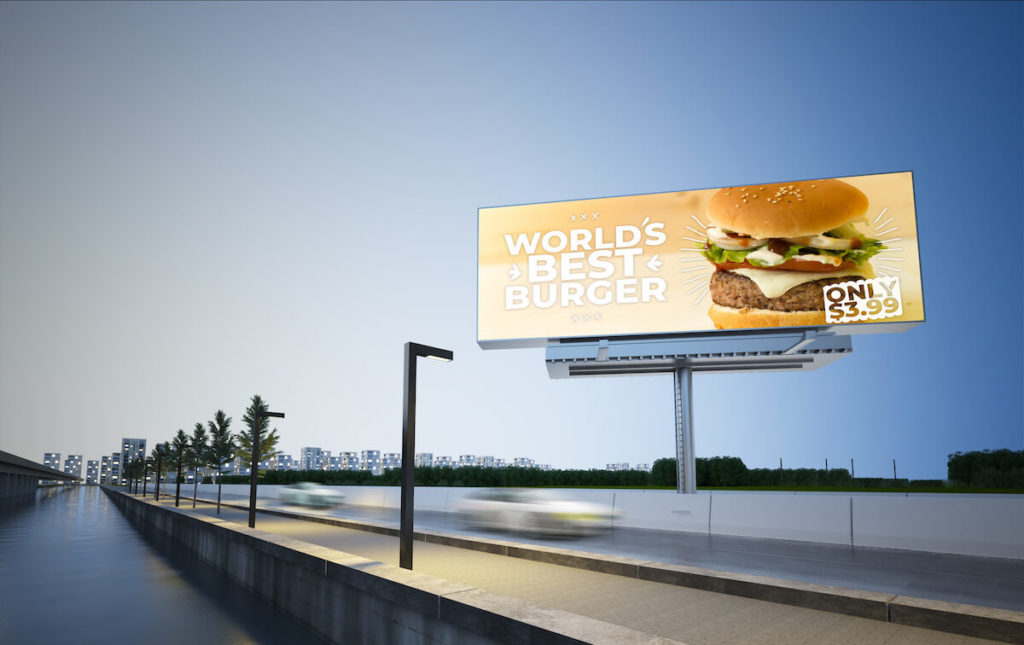8 budget-friendly small business advertising ideas

Key takeaways
- Advertising on social media networks and platforms like Yelp gives you greater control over who you’re reaching and how much you’re spending
- Maximize your ad performance by outlining your target audience and goals ahead of time
- All your ad campaigns should be fluid: Test things out, monitor the performance, and make changes as needed
Getting the best placement for your promotions is key to spreading your message. While online marketing alone can’t guarantee prime real estate, advertising can. Through small business advertising—which doesn’t have to cost you a fortune—you can customize exactly when, where, and how your potential customers will see your brand.
We’ve collected five proven ideas to build your small business advertising strategy as well as three tips to help you get the most out of your ad campaigns.
5 low-cost small business advertising ideas
When you think of traditional advertising mediums like TV ads, print ads, and direct mail, you might think of costly, bothersome messages sent to a mass audience. However, the ad landscape has changed a lot in the digital age. Brands now have more control over who sees their messages and even how much they’re paying to run ads.
With these local and digital advertising ideas, you can effectively reach people within your target market without breaking your budget.
1. Social media ads
Social media platforms are some of the best places for small business advertising. Not only are people spending hours scrolling through these apps and sites each day, but ad campaigns are fairly cheap to run (and “how cheap” is up to you) and can be extremely effective.
Thanks to the data that most social media platforms have on users, they allow you to target your specific audience based on their behaviors and characteristics. Once you launch your campaign—for example, a LinkedIn or Facebook ad—your content will show up right on your ideal customers’ feeds. Typically, you will only pay when people click your ad, which is called PPC (pay per click). As such, you can cater your message to your target audience‘s exact interests and get better results.
2. Yelp Ads
While social media ads help you reach more people on the platforms they frequent, Yelp Ads allows you to reach more shoppers who are actively in need of your products or services. After searching for businesses on Yelp, 90% make a purchase within a week, so it’s impactful to show up prominently on those local search results pages.
After claiming your Yelp Business Page, you can start running ads. These ads show up above user search results and on your competitors’ pages—driving users to call you, message you, visit your website, and engage with you more in general. This means more traffic and more leads faster.
You only pay when someone clicks, and you always have the freedom to adjust your budget based on your personal small business advertising needs.
3. Digital billboard ads

If you run a local business, thinking beyond internet-based ads can help expand your reach. Traditional billboards that require installation can be expensive, but with digital billboard ads, you can get thousands of eyes on your campaign for $100 or less.
Digital billboards, now offered nationally from companies like Blip Billboards and Fliphound, allow you to customize not only where your ad is seen, but also what times. You could maximize views by creating a rush hour ad campaign or advertise a specific service during an optimal time of day. For example, an emergency plumbing business might run a late night ad that says, “Pipe burst at night? We’re still up, too. Call 555-555-5555.”
4. Search engine ads
In addition to Yelp, many active shoppers turn to search engines to research their options before choosing a brand or business. While search engine optimization (SEO) can help your website rank higher for relevant search terms over time, search engine ads allow you to instantly claim the ad space above search results.
Just like social media and Yelp Ads, search engine ads give you an enormous amount of control over your campaign. Typically, you can set your own budget, select the keywords you want your business to show up for, and define your target demographics. Some search engines even allow you to target your audience based on whether users have been searching for similar products and services.
5. Event sponsorship
While sponsoring a national conference might be out of your budget, local events tend to offer affordable sponsorship packages for small business owners. Though pricing tiers may vary, these packages could help get your brand and logo on a number of social media ads, news stories, email marketing, website and on-site banners, and other promotional materials for considerable savings.
To get the most out of event sponsorship, consider the types of events people in your ideal customer base would attend. For example, you could target lawn care customers in your service area by sponsoring a local home and garden show. In addition to in-person events, you could also sponsor virtual events like webinars and giveaways.
Before committing to a sponsorship, do your research to ensure the event and event host align with your brand. By showing up as a sponsor, your company is backing the experience. Anything you append your name to must be something you want your brand to be associated with.
3 tips to make your small business advertising a success
The small business advertising tactics we provided are cost-effective compared to traditional ads, but if you want to get the best bang for your buck, you need to know how to build a campaign your potential customers will respond to. Here are three tips for implementing ad campaigns in your marketing strategy.
1. Understand your target audience

Before you invest in your first small business advertising campaign or even decide where you want to run your ad, get to know your target audience. Identify who you want to reach by defining their demographics (e.g., age range, income levels, occupations) as well as their interests and behaviors. You can then create a buyer persona—a detailed profile that represents a segment of your target market.
When you have a clear picture of your ideal customers, you can shape your ad and its message to best speak to their needs. You’ll also be able to accurately determine the platforms they use to research products/services and make purchases, so your brand can show up when they’re actively seeking products or services you offer.
Understanding your target audience is also critical for digital campaigns as you have a lot of control over who you’re targeting. The better you understand who you want to reach, the better you can steer your campaign in the right direction.
2. Know your goals
Every small business advertising campaign should be created with a goal in mind. Different platforms and ads create different results. For example, a digital billboard may be great for generating brand awareness, but if your goal is to quickly gain new customers, a clickable ad on Yelp or social media will likely connect you with people who are ready to buy.
Keep your goal in mind as you create your calls to action (CTA) as well. After viewing your ad, your audience should know exactly what the next step is. Whether you want them to join your email list or head to a specific page on your site, create a CTA that leads them in the right direction.
3. Keep tabs on your ad performance
Improving your small business advertising strategy over time is all about figuring out what works and what doesn’t, i.e., what is bringing in the most customers. As your ad campaigns launch, keep track of how they’re performing using metrics that make sense for your goal, then make adjustments accordingly.
For example, you might track website clicks and revenue if you want to increase ecommerce sales, or you might track ad engagement if you simply want to increase brand awareness.
Most digital ad providers offer real-time campaign metrics on their platforms. For other types of ads, you can still see the impact of your campaign by tracking your sales growth or by using free and low-cost website analytics tools to measure your site traffic. You can also consider a simple survey that asks first-time customers how they found you.
Get more out of your small business marketing
Digital marketing is great for building relationships with your audience over time, but when you want fast results, small business advertising can help you achieve them. Getting prime placement on the platforms your audience is using makes it easier for you to engage the right people with your messages, so you can effectively reach your goals. And thanks to modern ad mediums, you can drive results while staying well within your marketing budget. To further improve your return on investment from ad campaigns, continue to learn more about free online advertising ideas.
The information above is provided for educational and informational purposes only. It is not intended to be a substitute for professional advice and may not be suitable for your circumstances. Unless stated otherwise, references to third-party links, services, or products do not constitute endorsement by Yelp.



